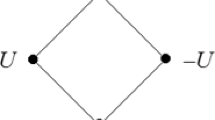Abstract
In this paper, we present a generic format for adaptive vague logics. Logics based on this format are able to (1) identify sentences as vague or non-vague in light of a given set of premises, and to (2) dynamically adjust the possible set of inferences in accordance with these identifications, i.e. sentences that are identified as vague allow only for the application of vague inference rules and sentences that are identified as non-vague also allow for the application of some extra set of classical logic rules. The generic format consists of a set of minimal criteria that must be satisfied by the vague logic in casu in order to be usable as a basis for an adaptive vague logic. The criteria focus on the way in which the logic deals with a special ⊡-operator. Depending on the kind of logic for vagueness that is used as a basis for the adaptive vague logic, this operator can be interpreted as completely true, definitely true, clearly true, etc. It is proven that a wide range of famous logics for vagueness satisfies these criteria when extended with a specific ⊡-operator, e.g. fuzzy basic logic and its well known extensions, cf. [7], super- and subvaluationist logics, cf. [6], [9], and clarity logic, cf. [13]. Also a fuzzy logic is presented that can be used for an adaptive vague logic that can deal with higher-order vagueness. To illustrate the theory, some toy-examples of adaptive vague proofs are provided.
Similar content being viewed by others
References
Batens, D., ‘A Survey of Inconsistency-Adaptive Logics’, in D. Batens, C. Mortens, G. Priest, and J. P. Van Bendegem (eds.), Frontiers of Paraconsistent Logic, Research Studies Press, 2000, pp. 49–73.
Batens, D., ‘The Need for Adaptive Logics in Epistemology’ in D. Gabbay, S. Rahman, J. Symons, and J. P. Van Bendegem (eds.), Logic, Epistemology and the Unity of Science Kluwer, 2004, pp. 459–485.
Batens D.: ‘A Universal Logic Approach to Adaptive Logics’. Logica Universalis 1, 221–242 (2007)
Esteva F., Godo L., Hájek P., Navara M.: ‘Residuated Fuzzy Logics with an Involutive Negation’. Archive for Mathematical Logic 39, 103–124 (2000)
Esteva F., Gispert J., Godo L., Noguera C.: ‘Adding Truth-Constants to Continuous T-Norm Based Logics: Axiomatization and Completeness Results’. Fuzzy Sets and Systems 158, 597–618 (2007)
Fine K.: ‘Vagueness, Truth and Logic’. Synthese 30, 265–300 (1975)
Hájek, P., Metamathematics of Fuzzy Logic, Kluwer Academic Publishers, 1998.
Hájek P.: ‘What is Mathematical Fuzzy Logic’. Fuzzy Sets and Systems 157, 597–603 (2006)
Hyde D.: ‘From Heaps and Gaps to Heaps of Gluts’. Mind 106, 641–660 (1997)
Malinowski, G., Many-Valued Logics, Oxford University Press, 1993.
Meheus J.: ‘An Adaptive Logic Based on Jaśkowski’s Approach to Paraconsistency’. Journal of Philosophical Logic 35(6), 539–567 (2006)
van der Waart van Gulik, S., and P. Verdée, ‘Modelling Sorites Reasoning with Adaptive Vague Logic’, Fuzzy Sets and Systems, (in print).
Williamson, T., Vagueness, Routledge, 1994.
Author information
Authors and Affiliations
Corresponding author
Rights and permissions
About this article
Cite this article
Verdée, P., van der Waart van Gulik, S. A Generic Framework for Adaptive Vague Logics. Stud Logica 90, 385–405 (2008). https://doi.org/10.1007/s11225-008-9158-x
Published:
Issue Date:
DOI: https://doi.org/10.1007/s11225-008-9158-x




